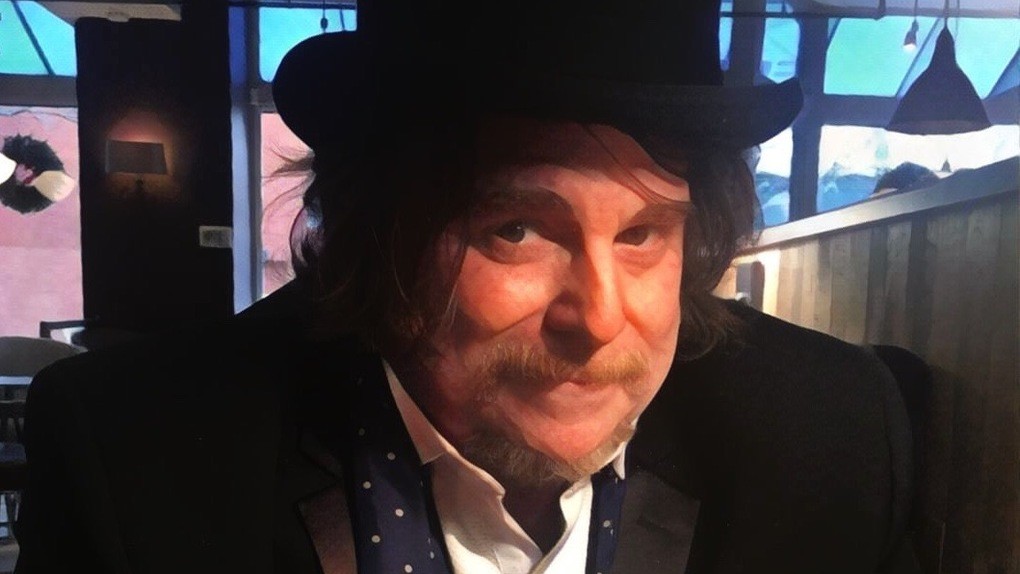After a career-threatening ailment, Ashley returns to rock with a little help from his friends.

Photo: Liz Linder
In a world where musicians are often beaten down and deprived of a livelihood by the current trends in music industry, it’s a pleasure to encounter Corin Ashley. Charming, talented and pretension-free, the Boston-based bassist and vocalist was first picked up on power pop radar in the late-1990s as a member of The Pills, before expanding his career to release a couple solo albums and landing opening gigs of a vast array of alt-rock favorites including The B-52s, The Libertines, Supergrass, Sloan, Juliana Hatfield, and The Smithereens. With all the good the perennially upbeat Ashley does in the music world – including a stint as a guest musical clue-giver at Rockerzine’s Rock and Roll Trivia – it would be hard to imagine a less-deserving chap to have his career suddenly upset in January of 2016 by a sudden stroke.
Now, after over a year of therapy and rehab, Ashley is back on track with bubbly, Beatle-y new release “Broken Biscuits;” an album recorded with (Big Star’s) Jody Stephens and featuring additions from fancy rock and roll friends like Tanya Donelly (Throwing Muses /Belly).
Eager to hear the full scoop , we caught up with Ashley in early June, as he prepared to play a mid-month house party gig with former Plimsoul, Peter Case.
ROCKER: I think it would be impossible to talk about the new record, and really about your career without talking about the stroke that you suffered last winter. So, wondering if you could talk about that. What happened? Had you already started the tracks that became Broken Biscuits before the stroke? How did the stroke affect the record, the songs, and you as an artist?
ASHLEY: I had started the record and had about half the song songs tracked, some of which needed lyrics. I was chugging along very nicely before I was derailed.
It was the most peculiar thing, really. I wouldn’t say it was out of nowhere because obviously I was aware that high blood pressure puts one at a risk of stroke, but I was on low dosage of medication for that. I had forgotten to take it that day and was at the gym, on the vile elliptical machine, trying to make up for a weekend of too much drinking, really. I was doing my thing with great gusto and I just lost track of how hard I was hitting the machine and my heart rate was way up for about 25 minutes when, all of a sudden, I got this weird grey stripe in my right eye. It was like a piece of thin gauze was hanging down over my eye, but it was inside and I couldn’t wipe it away. I kind of knew that probably wasn’t good and drove myself to the hospital. My left hand had gone all jelly- like, and when I got to the E.R, they whisked me right back.
Long story short, I had a dissection: a little tear in the lining in my carotid artery. That would have healed itself with a bit of rest and blood-thinners, but in the course of an MRI scan, I was given a contrast dye that I was allergic to. I went into anaphylactic shock with seizures and and flew out of my wheel chair and hit my head on the wall, it was a pretty major scene. I saw this flashing black and white light inside my head and knew that something very bad was happening, but I couldn’t say anything. When I came to, the fingers on my left hand didn’t work anymore and the left side of my face was droopy.
ROCKER: Fans often forget that musicians are athletes who use their bodies to ply their trade. Was there a moment of peril where you considered what it would be like to be unable have the physical ability to be a musician?
ASHLEY: Oh, absolutely. The first few days in the hospital were one miserable haze, floating in and out of consciousness, but when I was awake all I could think about is that I was probably all done being a musician. I make a living playing music, and I was really worried about what was going to happen to us as a family. I was very upset about the possibility of becoming a burden. Stroke is the number one cause of long- term disability in the U.S. People recover in many different ways and I was just extremely lucky that the neurologist on rounds the night I was brought to Beth Israel was Dr. Gottfried Schlaug, a classically trained organist who has made a 20 year study of how artists, and specifically musicians, recover from traumatic brain injuries. It only took a few days for him to get me all cranked up and determined to recover as fully as I could.
I have never worked as hard at anything in my life as I did at being able to play music again. 6 or 7 hours every day, no days off, playing scales and arpeggios very, very slowly- plus vocal therapy and working with a facial nerve specialist to try to get my smile back – you saw me at a show with my face taped into place with kinesiology tape, that was like that for 4 months; just trying to get those nerves in the right location so that they might receive signals being sent form my brain. A lot of it was based on rehab that has worked for other stroke patients, but it’s a very personal, internal thing. There is the physical work that needs to be done, but there’s also a lot of laying awake at night, really examining what is disconnected between your brain and the parts that aren’t working. I used to force myself to go to sleep thinking about chord shapes, just instinctually hoping my brain would keep working in that in my sleep.
Dr. Schlaug now says that he has never seen anybody’s hand recover so profoundly from an injury like mine. He calls it a “miracle”, which sounds nice and heroic, but I don’t know about that. I think it was more about being relentless and approaching the problem over and over from different angles and never taking a day off from trying to get back to playing and singing.
ROCKER: Has relearning your instrument and voice in any way changed your approach to music making? Are there ways in which things are different?
ASHLEY: I really went back to my building blocks as a musician. This is one of those things where I had to trust my instincts. It didn’t take more than a few weeks for me to be able to hold down a note on a keyboard or bass, which was encouraging. What I lost, though, was the innate sensibility of space on a guitar or bass neck. For instance, if was holding down an A at the 5th fret on my bass, my hand did not have the sense that A# was a bit to the right. My hand didn’t know how to play octaves or any other intervals, for that matter. It just had no muscle memory at all for that sort of thing. Instinctively, I remembered spending hours and hours playing alongg with “Zenyatta Mondatta” when I first picked up the bass at 14. A lot of Sting’s bass lines of that period are box shapes with a 5th, a flat 7 and an octave. Now, when I tell you that I played along with that album five hundred times, my poor wife who had to hear it downstairs over and over can vouch for that. And that was after two months straight of me playing “Green Eyed Lady” with a metronome at a ridiculously slow tempo for hours at a time. I was searching for exercises of riffs and songs I knew really well that had stretches. I kind of wanted to hit clams on things that I know inside and out because I knew my brain would want to fix them.
ROCKER: You have a lot of other rock n roll celebrity friends playing on this record, how did those partnerships come about? Did you approach people or were they approaching you? I of course remember The Pills, wondering how you contrast the group experience with being a solo artist that still welcomes guests to come along. What have you felt were the pluses and minuses?
ASHLEY: Ha! My rock and roll celebrity friends and I appreciate this question. This album is a lot less name-droppy than the last one. By the way, I am close personal friends with Al Kooper and he told me that name-dropping is really in bad taste!
Well, let’s see, [Throwing Muses’] Tanya Donelly wrote and sang the bridge to “Wind Up Boy” and, though I have admired her for years, we met properly because I played guitar with my buddy [Letters to Cleo] Kay Hanley at one of the Hot Stove benefits. She was on the show and we just bonded over Yoko Ono in the dressing room. Tanya is so-ooo nice, just a really lovely person (I used to be scared of her around the time of the first Breeders album). This song, “Wind Up Boy” was based on a graphic novel of the OZ sequels that L. Frank Baum wrote. My son and I were reading them every night at bedtime and that’s where it came from, and it was very mechanical and purposefully stiff. I thought that it could use the relief of something bit more human sounding in the bridge. I kept saying “This thing needs some blood and guts as contrast”, so I asked Tanya if she could add some of that to the song.
How to contrast the group experience with being a solo Corin? Being a bass player by nature, I very much prefer a collaborative setting. If either of the Daves in The Pills still still lived in Boston, I would be playing with them because that’s what I really love: being in a band with Daves. In fact, I am often surprised that I am not in a rock band with a Dave. I am very lucky that Cory and Matt from the Pills still play with me sometimes, so I can pretend I’m still in a rock band at all. The other side of that is that their enthusiasm for driving long distances to play for no money has diminished slightly as we’ve gotten older, so I have developed a really solid solo acoustic set. If you write songs and release an album, I think you do have a certain responsibility go play them for people. I have gotten really good at that kind of singer/songwriter thing, too. It doesn’t hit me in the gut like playing bass, but it’s a different kind of playing experience that’s very intimate. You can’t believe how intimate some of my out of town shows are, actually. It’s intimate out the yin-yang! That’s a really good title for my acoustic live album, actually. I call dibs on that.
ROCKER: Tracks on the record hang together but aren’t necessarily alike, there’s shorts and longs and everything in between. Did you take a lot of time with sequencing and what thought was put to the variety? Is sequencing even a thing anymore?
ASHLEY: I do believe sequencing is important and I think in terms of an album, not just a bunch of songs in the same place. I feel a bit old- fashioned about it, honestly. As long as the songs can also stand by themselves, I think it’s OK, but I enjoy working on those transitions. I’m torn. A lot of the people who buy my music are power pop guys and I really appreciate that part of my audience, but I don’t want to be limited to just making music for dudes my age who have the same record collection as me. I actually do listen to some music made in this century.
ROCKER: My favorite track on the new record is “Little Crumbles”, a tune that begs the question “can we be too Beatle-y”? I myself wrassle with this question. I mean, hey, I like it! What do you think?
ASHLEY: Well, it’s too Wings-y, really. That goes back to your last question. I cut that song before my stroke and it was clearly an album opener right from the get-go. But then there’s a part me that thinks that I should bury a track like that later in the sequence because all the reviews are just going to say “Power Pop”, ELO, McCartney, etc. and it’s like handing it to reviewers on a plate if that’s the opening track. But then, if you don’t start off with a track that really grabs them, you don’t get reviewed at all. There’s so much music that comes out all the time, how do you even stand out a tiny bit? I think there’s something to be said for making it easy on the reviewer, too. Not that it’s all about reviews, but I also felt like listeners would really groove on thats song right away. I mean, it’s a Wings song that turns into ABACAB by Genesis in the middle, so what’s not to like? And it name-checks “Thrillington”, that’s a wink to the McCartney geeks so they would know that I am acknowledging the influence.
ROCKER: Could you talk about your anti-Trump track you did with Cliff Hillis, how it came about and if you’re planning any further forays into political tunes?
ASHLEY: I was very hesitant to write a straight political protest song, actually. I think that’s a time- honored and established form of songwriting, but it is not my area of expertise and I wasn’t completely sure I could make my point without being preachy. Nobody likes to be preached at in a song, and I usually write about psychedelic ladybugs and cosmic fruity things. But I reject the notion that musicians should keep their mouth shut about things that any other citizen has the right to discuss. I pay taxes, I vote, why should my job disqualify me from expressing an opinion? I am so incredibly offended and upset at what has happened in this country that I found it hard to not just write a song that merely raged against the orange hate machine currently residing in the White House. The trick, to me was to write a really catchy protest song, not just bitch and moan and turn listeners away. I want people who disagree with me completely to not be able to get that chorus out of their head. It’s called “Vulgar Stain” and people can check it out through my website. And if someone writes a really good pro-Trump song, I’ll give that a listen. Of course, those kind of songs are never any good, are they? It’s always blanket patriotism disguising a really weak tune.
People used to always say that it’s OK to disagree with a political position, but you “have to respect the office”, and I don’t think that’s actually true anymore. I think that the core message of the Donald Trump presidency is that you can just be a lousy human being with no political experience, a long track record of screwing American workers and contractors who have done work with you, clear conflicts of interest and an established association with hate groups, no discernible ideology beyond self- promotion and you can sit in the oval office and just be factually wrong about everything. And then these fucknuts try too say something I just saw with my own eyes is “fake news”? I grew up in the country, I recognize horse shit when I smell it. Rub my nose in it over and over and I really start to figure it out. That’s a stain on our entire system, That changes a lot about what the presidency means, fundamentally. A lot of flawed men have held that job before and, in some way, the presidency made them better, made them think on a bigger scale. I do not think that is a possibility with this complete turd, this empty vessel of pure fuckery.
Now, see Erin? You’ve got me all worked up! Those are exactly the kind of phrases I was trying to avoid when writing that song.
ROCKER: What’s coming up next for you?
ASHLEY: Lots and lots of playing music! You know when people say “I’m happy to be here” at a show? It’s the most trite thing a performer can say, really. Well, when I say it now, I 100% mean it. I’m doing a house concert on June 18th with Peter Case of The Plimsouls in East Boston. He’s one of my favorite writers, so I’m excited about that.
ROCKER: I know you previously told me that you are “Broken Biscuits.” I suppose the question is, after all you’ve been through, is it a good thing or a bad thing? Or is it just a thing you are or have been and in the future you won’t be?
ASHLEY: I used that image as metaphor for what I felt like after the stroke: all blasted apart and trying to stick the crumbles back together. I’m pretty well back together now. I learned something about how much fortitude I have when it comes right down to it, so that’s a good thing. I also faced the possibility of not being a musician anymore and what that might mean about who I am. It’s all I ever wanted to do and I had to reconcile myself to the idea that, if I couldn’t do it anymore, at least I got what I aimed for as a little boy. Most people don’t get to do that in life, so even in the middle of it being all blown up, I found moments of gratitude. I hesitate to use the word “wisdom”, but I do think I learned a few things along the way that have made me a better me than I was before.
___




